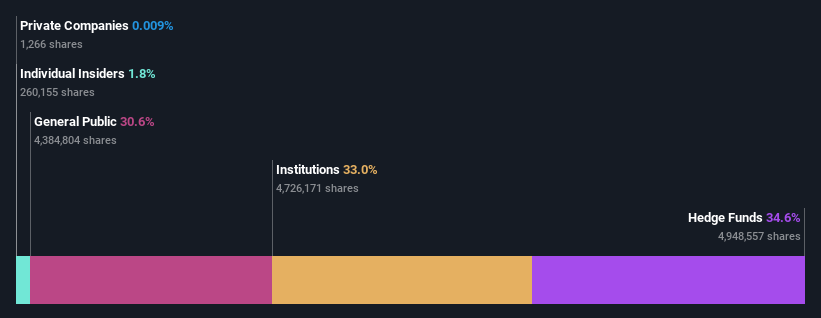Merrimack Pharmaceuticals, Inc. (NASDAQ:MACK) is definitely on the radar of hedge funds investors who own 35% of the company
Key Insights
Significantly high institutional ownership implies Merrimack Pharmaceuticals' stock price is sensitive to their trading actions
A total of 7 investors have a majority stake in the company with 51% ownership
Using data from company's past performance alongside ownership research, one can better assess the future performance of a company
To get a sense of who is truly in control of Merrimack Pharmaceuticals, Inc. (NASDAQ:MACK), it is important to understand the ownership structure of the business. With 35% stake, hedge funds possess the maximum shares in the company. Put another way, the group faces the maximum upside potential (or downside risk).
Because hedge funds owners have a huge pool of resources and liquidity, their investing decisions tend to carry a great deal of weight, especially with individual investors. Therefore, a good portion of institutional money invested in the company is usually a huge vote of confidence on its future.
Let's delve deeper into each type of owner of Merrimack Pharmaceuticals, beginning with the chart below.
Check out our latest analysis for Merrimack Pharmaceuticals
What Does The Institutional Ownership Tell Us About Merrimack Pharmaceuticals?
Many institutions measure their performance against an index that approximates the local market. So they usually pay more attention to companies that are included in major indices.
We can see that Merrimack Pharmaceuticals does have institutional investors; and they hold a good portion of the company's stock. This implies the analysts working for those institutions have looked at the stock and they like it. But just like anyone else, they could be wrong. When multiple institutions own a stock, there's always a risk that they are in a 'crowded trade'. When such a trade goes wrong, multiple parties may compete to sell stock fast. This risk is higher in a company without a history of growth. You can see Merrimack Pharmaceuticals' historic earnings and revenue below, but keep in mind there's always more to the story.
Our data indicates that hedge funds own 35% of Merrimack Pharmaceuticals. That's interesting, because hedge funds can be quite active and activist. Many look for medium term catalysts that will drive the share price higher. Looking at our data, we can see that the largest shareholder is Western Standard, LLC with 15% of shares outstanding. Newtyn Management, LLC is the second largest shareholder owning 13% of common stock, and ADAR1 Capital Management, LLC holds about 6.3% of the company stock. Furthermore, CEO Gary Crocker is the owner of 0.9% of the company's shares.
On further inspection, we found that more than half the company's shares are owned by the top 7 shareholders, suggesting that the interests of the larger shareholders are balanced out to an extent by the smaller ones.
While it makes sense to study institutional ownership data for a company, it also makes sense to study analyst sentiments to know which way the wind is blowing. As far as we can tell there isn't analyst coverage of the company, so it is probably flying under the radar.
Insider Ownership Of Merrimack Pharmaceuticals
The definition of an insider can differ slightly between different countries, but members of the board of directors always count. The company management answer to the board and the latter should represent the interests of shareholders. Notably, sometimes top-level managers are on the board themselves.
I generally consider insider ownership to be a good thing. However, on some occasions it makes it more difficult for other shareholders to hold the board accountable for decisions.
Our most recent data indicates that insiders own some shares in Merrimack Pharmaceuticals, Inc.. It has a market capitalization of just US$211m, and insiders have US$3.8m worth of shares, in their own names. Some would say this shows alignment of interests between shareholders and the board. But it might be worth checking if those insiders have been selling.
General Public Ownership
The general public, who are usually individual investors, hold a 31% stake in Merrimack Pharmaceuticals. While this group can't necessarily call the shots, it can certainly have a real influence on how the company is run.
Next Steps:
While it is well worth considering the different groups that own a company, there are other factors that are even more important. Be aware that Merrimack Pharmaceuticals is showing 2 warning signs in our investment analysis , and 1 of those is potentially serious...
If you would prefer check out another company -- one with potentially superior financials -- then do not miss this free list of interesting companies, backed by strong financial data.
NB: Figures in this article are calculated using data from the last twelve months, which refer to the 12-month period ending on the last date of the month the financial statement is dated. This may not be consistent with full year annual report figures.
Have feedback on this article? Concerned about the content? Get in touch with us directly. Alternatively, email editorial-team (at) simplywallst.com.
This article by Simply Wall St is general in nature. We provide commentary based on historical data and analyst forecasts only using an unbiased methodology and our articles are not intended to be financial advice. It does not constitute a recommendation to buy or sell any stock, and does not take account of your objectives, or your financial situation. We aim to bring you long-term focused analysis driven by fundamental data. Note that our analysis may not factor in the latest price-sensitive company announcements or qualitative material. Simply Wall St has no position in any stocks mentioned.

 Yahoo Finance
Yahoo Finance 
